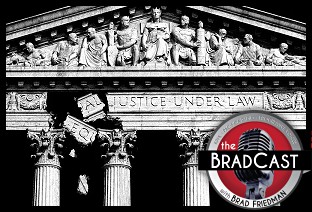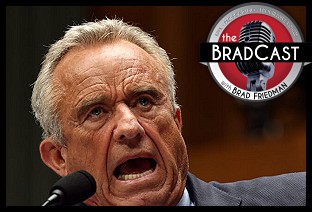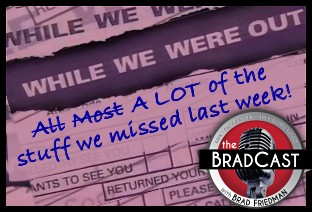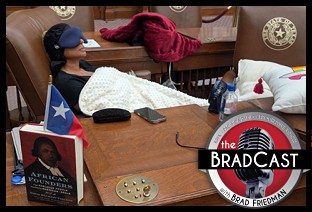Guest editorial by Ernest A. Canning
 Californians are all too familiar with the disturbing image now playing out in DC.
Californians are all too familiar with the disturbing image now playing out in DC.
Radical-right ideologues demand extension of the Bush tax cuts, retention of corporate subsidies, deregulation, a squandering of public funds on privatization schemes and pouring what is left of the National Treasury down the economic black hole that is war and the military-industrial complex. Hypocritically, they not only point to the massive deficits they themselves have erected, but hold a gun to the head of government, threatening to shut it down absent drastic concessions designed to extract a pound of flesh from those who can least afford cuts in government services as they target the last vestiges of the New Deal safety net.
In California, a small minority of fiscally irresponsible, radical right-wing ideologues has employed the "give-us-what-we-demand-or-we-shut-down-the-government" tactic for over a decade, with devastating results.
The state's new (again) Governor Jerry Brown (D) would have done well to have read Paul Krugman's The Great Unraveling before he re-entered office last January.
Krugman aptly described the radical right that, in 2000, seized the reigns of the federal government as a "revolutionary power" which does not accept the legitimacy of our democratic system and which cannot be expected to negotiate in good faith.
Three months into fruitless negotiations, Brown recently came to realize that even though the state faces a catastrophic $26 billion deficit, CA Republicans would never allow the state's voters to decide whether to extend the temporary taxes on income, sales and vehicles to help cover the short fall.
After negotiations broke down last month, Brown said: "Each and every Republican legislator I've spoken to believes that voters should not have this right to vote unless I agree to an ever-changing list of collateral demands....Republicans demand that out-of-state corporations that keep jobs out of California be given a billion-dollar tax break that will come from our schoolchildren, public safety and our universities. This I am not willing to do."
While the Governor has openly considered by-passing the Republicans in order to permit direct democracy in which Californians themselves would vote on a temporary tax extension, that approach, even if successful, falls well short of the fundamental problem --- that the current 2/3 vote required to pass revenue legislation in the state's legislature permits an irresponsible minority of right wing ideologues to hold the state hostage as it carries out its democracy-destroying and economically unsustainable, privatization agenda...
Engineering California's Economic Collapse, revisited
As I observed in a November 2009 article, "Engineering California's Economic Collapse", the state's "looming fiscal catastrophe did not arrive by accident. It is, according to a number of progressive policy experts, the intended product of a Republican-led privatization scheme" which succeeded, in large measure, because California was then "the only state where a 2/3 majority approval is required on all revenue and budget legislation."
The radical-right agenda, dubbed "starve the beast" by Grover Norquist, is intended to create such a massive sea of red ink that the government "could be drowned in a bathtub." As Bill Moyers observed in Moyers on America, the radical right agenda is "systematically stripping government of its capacity...to do little more than reward the rich and wage war."
By coupling the crippling of government with union-busting, the right seeks nothing less than "an atomized society of disengaged individuals who feel demoralized and socially powerless" in the face of unchecked corporate wealth and power.
California's Democratic mandate for change
With the exception of the race for Attorney General where Kamala Harris (D) narrowly defeated Steve Cooley (R) (46.1% to 45.3%), CA Democrats bucked the national trend and defeated Republicans by a wide margin for every statewide office in 2010.
The Democrat Brown trounced his Republican billionaire opponent Meg Whitman (R) by a margin of 53% to 42%. That, despite Whitman's having spent a record $142 million on her campaign. Barbara Boxer (D) defeated former Hewlett Packard CEO Carly Fiorina (52% to 42.6%) in the U.S. Senate race. Gavin Newson (D) defeated Abel Maldenado (R) for Lt. Governor (50.2% to 39%). State Treasurer Bill Lockyer (D) defeated Mimi Waters (R) (56.5% to 36.2%). Secretary of State Deborah Bowen (D) defeated Damon Dunn (R) (53.1% to 38.6%).
Democrats also maintained significant majorities in both houses of the California Legislature. The CA Senate Democrats outnumber Republicans 25 to 15. There are 52 Democrats in the Assembly as compared to only 27 Republicans.
Yet, here we are, just over five months after Californians soundly rejected the radical-right agenda at the polls, and it is the Republicans who are still dictating policy. And we call that democracy?
Democracy is the only real defense to the radical right agenda
In Nov. 2009, George Lakoff, a professor of linguistics at the University of California, proposed a solution --- the California Democracy Act; a ballot initiative which read: "All legislative action on revenue and budget must be determined by a majority vote."
That failed, but not because Californians are adverse to the idea. Lakoff's cash-strapped, citizens-initiative failed to garner enough signatures to place it on the November 2010 ballot.
California citizens were given the opportunity to vote for a half-a-loaf --- Proposition 25, which permits state legislators to pass a budget by a simple majority instead of the two-thirds majority requirement. It was approved by a comfortable margin (55.1% to 44.9%).
But that measure only allows for budget items, in other words, spending matters, not revenue (tax items) to be decided by a majority. Increasing revenue in any way still requires a two-third majority, hand-cuffing the governor and crippling the state legislature's ability to do so, as Republicans stand firm against any form of responsible taxation to help close the fiscal gap.
It would indeed be appropriate for Governor Brown and California Democrats to by-pass the minority and take their case directly to the voters, but that case should not be a stop-gap, temporary solution of tax extensions. The core of the problem is the undemocratic 2/3 rule. Democratic governance can be achieved only when a simple majority of the people's representatives are able to pass revenue legislation.
Ernest A. Canning has been an active member of the California state bar since 1977. Mr. Canning has received both undergraduate and graduate degrees in political science as well as a juris doctor. He is also a Vietnam vet (4th Infantry, Central Highlands 1968).


 'Green News Report' 9/18/25
'Green News Report' 9/18/25
 MAGA Exploiting Kirk's Death as Their 9/11: 'BradCast' 9/17/25
MAGA Exploiting Kirk's Death as Their 9/11: 'BradCast' 9/17/25 Our Crumbling Courts and Withering Rule of Law: 'BradCast' 9/16/25
Our Crumbling Courts and Withering Rule of Law: 'BradCast' 9/16/25 'Green News Report' 9/16/25
'Green News Report' 9/16/25 After Kirk Murder, First Amendment, But Not Second, Under Attack. Prove Me Wrong: 'BradCast' 9/15/25
After Kirk Murder, First Amendment, But Not Second, Under Attack. Prove Me Wrong: 'BradCast' 9/15/25 Sunday 'False Narrative' Toons
Sunday 'False Narrative' Toons SCOTUS Suspension of 4th Amendment Rights Poses Ominous Threat to Constitutional Republic
SCOTUS Suspension of 4th Amendment Rights Poses Ominous Threat to Constitutional Republic 'Dark Moment for America': 'BradCast' 9/11/25
'Dark Moment for America': 'BradCast' 9/11/25 Kirk Assassinated in UT; Shutdown Battle Takes Shape in D.C.: 'BradCast' 9/10/25
Kirk Assassinated in UT; Shutdown Battle Takes Shape in D.C.: 'BradCast' 9/10/25 Despite Voting Co. Lawsuit, Fox Ready to Shout Fake 'Fraud' Again: 'BradCast' 9/9
Despite Voting Co. Lawsuit, Fox Ready to Shout Fake 'Fraud' Again: 'BradCast' 9/9  'Green News Report' 9/9/25
'Green News Report' 9/9/25 Trump Readies Wars on Venezuela and Chicago: 'BradCast' 9/8/25
Trump Readies Wars on Venezuela and Chicago: 'BradCast' 9/8/25 Sunday 'Big Ball Room' Toons
Sunday 'Big Ball Room' Toons 'Green News Report' 9/4/25
'Green News Report' 9/4/25 RFK Jr.'s War on the Science of Public Health: 'BradCast' 9/4/25
RFK Jr.'s War on the Science of Public Health: 'BradCast' 9/4/25 Trump's 'Cook'ed-Up Mortgage Fraud Claims: 'BradCast' 9/3/25
Trump's 'Cook'ed-Up Mortgage Fraud Claims: 'BradCast' 9/3/25 While We Were Out: 'BradCast' 9/2/25
While We Were Out: 'BradCast' 9/2/25 Hypocrisy Behind RW Opposition To CA 'Election Rigging Response Act'
Hypocrisy Behind RW Opposition To CA 'Election Rigging Response Act' CA's 'Deterrence' Map; Trump's 'Fascist Theatre': 'BradCast' 8/21/25
CA's 'Deterrence' Map; Trump's 'Fascist Theatre': 'BradCast' 8/21/25 Trump's 'Stalinesque' Plot to Whitewash History: 'BradCast' 8/20/25
Trump's 'Stalinesque' Plot to Whitewash History: 'BradCast' 8/20/25 TX GOP Imprisons Dem State Lawmaker in State House: 'BradCast' 8/19/25
TX GOP Imprisons Dem State Lawmaker in State House: 'BradCast' 8/19/25 Trump, Nazis and Trump's Nazified Elections: 'BradCast' 8/18/25
Trump, Nazis and Trump's Nazified Elections: 'BradCast' 8/18/25
 VA GOP VOTER REG FRAUDSTER OFF HOOK
VA GOP VOTER REG FRAUDSTER OFF HOOK Criminal GOP Voter Registration Fraud Probe Expanding in VA
Criminal GOP Voter Registration Fraud Probe Expanding in VA DOJ PROBE SOUGHT AFTER VA ARREST
DOJ PROBE SOUGHT AFTER VA ARREST Arrest in VA: GOP Voter Reg Scandal Widens
Arrest in VA: GOP Voter Reg Scandal Widens ALL TOGETHER: ROVE, SPROUL, KOCHS, RNC
ALL TOGETHER: ROVE, SPROUL, KOCHS, RNC LATimes: RNC's 'Fired' Sproul Working for Repubs in 'as Many as 30 States'
LATimes: RNC's 'Fired' Sproul Working for Repubs in 'as Many as 30 States' 'Fired' Sproul Group 'Cloned', Still Working for Republicans in At Least 10 States
'Fired' Sproul Group 'Cloned', Still Working for Republicans in At Least 10 States FINALLY: FOX ON GOP REG FRAUD SCANDAL
FINALLY: FOX ON GOP REG FRAUD SCANDAL COLORADO FOLLOWS FLORIDA WITH GOP CRIMINAL INVESTIGATION
COLORADO FOLLOWS FLORIDA WITH GOP CRIMINAL INVESTIGATION CRIMINAL PROBE LAUNCHED INTO GOP VOTER REGISTRATION FRAUD SCANDAL IN FL
CRIMINAL PROBE LAUNCHED INTO GOP VOTER REGISTRATION FRAUD SCANDAL IN FL Brad Breaks PA Photo ID & GOP Registration Fraud Scandal News on Hartmann TV
Brad Breaks PA Photo ID & GOP Registration Fraud Scandal News on Hartmann TV  CAUGHT ON TAPE: COORDINATED NATIONWIDE GOP VOTER REG SCAM
CAUGHT ON TAPE: COORDINATED NATIONWIDE GOP VOTER REG SCAM CRIMINAL ELECTION FRAUD COMPLAINT FILED AGAINST GOP 'FRAUD' FIRM
CRIMINAL ELECTION FRAUD COMPLAINT FILED AGAINST GOP 'FRAUD' FIRM RICK SCOTT GETS ROLLED IN GOP REGISTRATION FRAUD SCANDAL
RICK SCOTT GETS ROLLED IN GOP REGISTRATION FRAUD SCANDAL VIDEO: Brad Breaks GOP Reg Fraud Scandal on Hartmann TV
VIDEO: Brad Breaks GOP Reg Fraud Scandal on Hartmann TV RNC FIRES NATIONAL VOTER REGISTRATION FIRM FOR FRAUD
RNC FIRES NATIONAL VOTER REGISTRATION FIRM FOR FRAUD EXCLUSIVE: Intvw w/ FL Official Who First Discovered GOP Reg Fraud
EXCLUSIVE: Intvw w/ FL Official Who First Discovered GOP Reg Fraud GOP REGISTRATION FRAUD FOUND IN FL
GOP REGISTRATION FRAUD FOUND IN FL

































